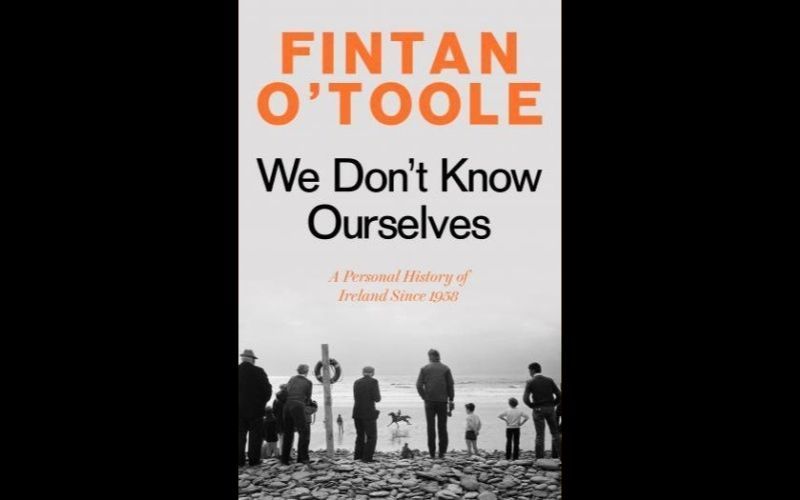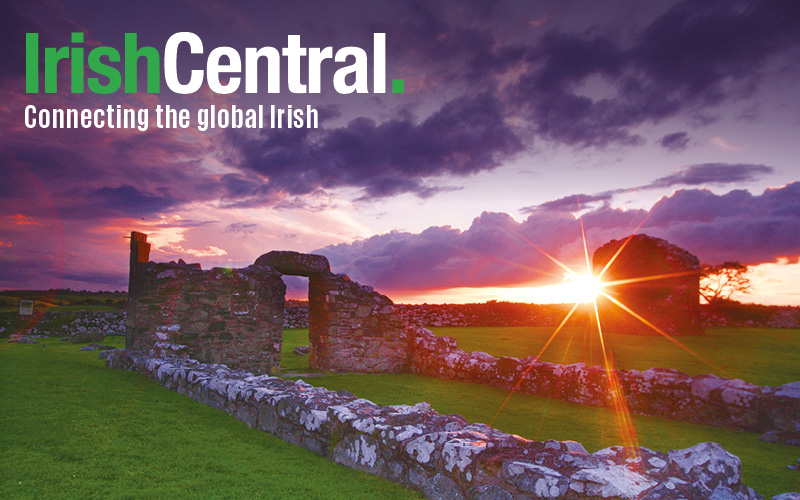It's possible over the course of just one lifetime to see the world you've grown up in and all of its certainties stood on their head. That happened to the generation that grew up in the 1960s in Ireland in a social climate that's now as lost as Atlantis.
In "We Don't Know Ourselves, A Personal History Of Modern Ireland," journalist Fintan O'Toole has taken a flinty-eyed and often funny look at the transformation of our nation from one time conservative theocracy to its first in the world vote for equal marriage.
Last week, he spoke to journalists in New York City about its unexpected bestseller success in America and the lessons it carries.

"We Don't Know Ourselves" by Fintan O'Toole. (Liveright Publishers)
In his look at the changes that have marked our transformation from paranoid post-colonial theocracy to progressive European trailblazer, O'Toole has lived the changes he writes about.
Beginning his talk to a gathering of invited New York Irish journalists on April 24, O'Toole spoke the two words that haunted his childhood and the childhoods of many around him: Letterfrack and Daingean.
These were the names of the two most feared Industrial Schools in Ireland, the ones that “bad boys” were sent to for terrible crimes like stealing a loaf of bread.
Between the years 1940 to 1970, 147 children reportedly died in Letterfrack in Connemara while in the “care” of the Christian Brothers. There was evidence of acute physical and sexual abuse there going back to the 1930s.
In Daingean, a similar reign of terror prevailed, with flogging and other physical abuse creating an atmosphere of horror that has haunted many who passed through it for life.
“I wondered how did I know those two words?” he told the journalists. “I don't remember anyone saying Letterfrack or Daingean to me very often but they were everywhere - and yet nowhere.
"When Mary Raftery – who is probably the greatest journalist of our times - did three documentary films about the industrial schools in 1999 called 'States Of Fear,' I remember everyone was shocked and appalled. Yet everyone knew.”
That weird cognitive dissonance, that ability to hold two conflicting pieces of information at once, to know and not know, was the origin of his best-selling book. And the study was not simply academic, it was part of his own family life, he says.
“My father had a broken skull and we have different stories about how he got it.
"It was only quite late on that I got the real story, which was that his stepfather had thrown him down the stairs. He was a brute and so the question was, why did his mother – my grandmother - stay with him?
"And the answer was she married him because it was the only way to keep the kids out of the industrial schools. And she knew it was worse, you know, that the worst thing was having your kids being taken into these institutions.
“That's a very dark way of talking about this sort of doubleness, where lots of people were highly aware of the way that parts of Irish society worked. But we had this extraordinary capacity not to recognize it.”

Looking for Irish book recommendations or to meet with others who share your love for Irish literature? Join IrishCentral’s Book Club on Facebook and enjoy our book-loving community.
In the decade of his birth, the country was floundering. “There were only two countries in Europe that lost population in the 1950s," O'Toole said. "One was East Germany and the other one was Ireland. The population was just leaving, young people were leaving in droves.
"And they were leaving to go back to the old colonial oppressor. They were choosing to live in England. All my father's family, his siblings were in England, all my cousins were living in Birmingham and London.”
'Island for lease, current owners leaving,' ran a poignant cartoon that caught the eye of T.K. Whitaker, the gifted Irish economist and Secretary of the Department of Finance.
“He was in his late 30s from Rostrevor in the north,” said O'Toole. “He was an Irish speaker and devout Catholic, and he had come to live and work in the Republic because he believed in Irish nationalism, he wasn't a rebel.
“But he realized that in order for things to stay the same, things would have to change. That really was the ironic T.K. Whitaker idea, that in order to keep Catholic nationalist Ireland, we've had to change how our society operated radically.”
Ireland would have to open up to foreign capital and it would have to attract private capital, Whitaker wrote.
“I think Whitaker thought, you could do it and it wouldn't really change Catholicism, it wouldn't really change the structure of governing and theology the way it was.
"And in fact, Catholicism still did pretty well in terms of its control of the society, right up to the end of the 20th century.
“And then it collapses with extraordinary intensity. I'm not talking about Catholicism as a faith, I'm talking about this peculiar fusion of Catholicism and nationalism as a governing ideology. But when it went it went with astonishing rapidity.”
Albania got state television before Ireland did, O'Toole notes. “The Irish government didn't want to do television, but they had to because more and more people would be putting up huge ariels and getting the BBC. So London finally forced them into having a TV station to stop people being influenced by BBC.
“And of course, it was opened by the Archbishop of Dublin and it was headed by [Edward Roth] an Irish American, some good Catholic boy from Boston, who was the first director of programs and all he could do was buy programs from ABC and the entire back catalog of NBC and ABC.
"So we started watching American kids college programs and this huge American cultural influence started coming in.”
The great challenge before us in 2023 is how to deal with the unexpectedly promising path ahead that nothing in our past has prepared us for.
“There is always an urge to fill it with stupid slogans or populism," O'Toole said. "But if instead you can live with uncertainty, and you're not susceptible to every demographic who wants to tell you they know the future, and can control the future, we will be okay.
"I think, by and large, Ireland has gotten to a point where actually there is more comfort with that uncertainty.”
O'Toole concluded: “There was a big international survey a couple of years ago that asked people would you like your country to be the way it used to be? And the two countries who said no were China and Ireland.
"We may be very sentimental but we're not nostalgic. That will save us from the kind of populism we have seen elsewhere.”
"We Don't Know Ourselves, A Personal History Of Modern Ireland" is published by Liveright, $32.00.




Comments